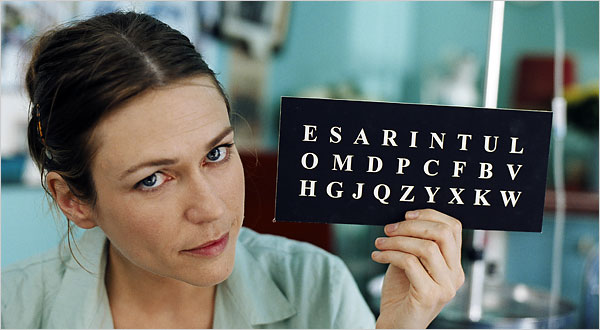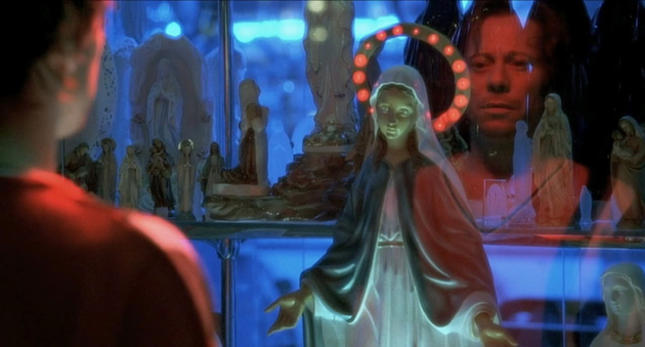“Cheering and screaming! Every Sunday I would cheer and scream for what?! How can they do this! 13-3 and home field advantage and they lost to the f**king New York Giants!…ELI SUCKS!” How did William Shirer miss this? As seen at TNR: From deep within his bunker, Adolf Hitler laments the Dallas Cowboys’ season. Perhaps in poor taste, as jokes making light of the Nazis often are, but still, I found this pretty doggone funny. (And it brought back fond memories of Mr. Bimmler.)
Category: Europe
Lisa Gherardini musta had the highway blues.
“‘All doubts about the identity of the Mona Lisa have been eliminated by a discovery by Dr. Armin Schlechter,’ a manuscript expert, the library said in a statement on Monday…’There is no reason for any lingering doubts that this is another woman,’ Leipzig University art historian Frank Zoellner told German radio. ‘One could even say that books written about all this in the past few years were unnecessary, had we known.’“
After studying notes scribbled in a 1503 book, German art historians argue they’ve definitively pinned down the identity of the Mona Lisa. “Lisa Gherardini, the wife of a wealthy Florentine merchant, Francesco del Giocondo, has long been seen as the most likely model for the 16th-century painting…[the notes] confirm once and for all that Lisa del Giocondo was indeed the model for one of the most famous portraits in the world.” [Via Daily Dish.]
Obama: Bigger than Hasselhoff.
“The Berliner Morgenpost over the weekend ran with the headline, ‘The New Kennedy.’ The tabloid Bild went with, “This Black American Has Become the New Kennedy!’” Speaking of JFK, it seems Iowa and (hopefully) New Hampshire are not alone. Obama-mania is sweeping Germany. “An editorial in the Frankfurter Rundschau went one historic president better with a headline that read simply: ‘Lincoln, Kennedy, Obama,’ adding that ‘hope and optimism’ are ‘the source of the nation’s strength.’” (I was going to say something along the lines of “But is Obama a jelly donut?” As I just discovered, though, that oft-told “Berliner” gaffe may not be true.)
God Save the Qwiin.
“When she saw William playing a game after lunch at Sandringham she thought the Nintendo looked tremendous fun and begged to join in. She played a simple ten-pin bowling game and by all accounts was a natural.” Hey, Helen Mirren, how much ya bowl? By way of Web Goddess, it seems Queen Elizabeth has taken to the Wii. “Although she is 81 the Queen’s hand-eye co-ordination was as good as somebody half her age…She showed all the signs of becoming a Nintendo addict.”
In the Blink of an Eye.

“Euh ess ahh err eee enn teh veh, ell, oh…” Suffice to say, I’m so glad I’m not writing this entry letter-by-letter (and in French to boot.) The first half of a powerful Saturday afternoon double-feature at the Angelika, Julian Schnabel’s The Diving Bell and the Butterfly, from the painstakingly-crafted memoir by Jean-Dominique Bauby, is an impressive and heartfelt depiction of how one man’s personal Hell becomes, through love, will, memory, and imagination, at least a barely endurable purgatory. At first glance, a film about being almost completely immobilized in a hospital bed for months and years on end may not seem like your cup of tea — I wasn’t sure it would be mine. But, despite the inherent sadness to Bauby’s story, Diving Bell is in fact overflowing with humor and even joie de vivre in the face of horrific tragedy. Yes, it says, you don’t know what you’ve got until it’s gone. But, even if you’ve lost everything, including basic motor function…well, all you have to do is dream.
The Diving Bell and the Butterfly begins in a blur. Blue-gray blobs fade in and out of vision, ultimately rectifying into institutional decor and men in white coats. We’re in a hospital room, but we, and our narrator Jean-Do Bauby (Mathieu Amalric, of Munich) don’t know why or how we got there. Worse, while we hear our narrator perfectly fine, nobody else can. It seems Bauby can no longer speak. Nor can he do anything else for that matter, except look around the room in abject horror and blink. Eventually, one of the doctors explains that Bauby has had a stroke, is emerging from a coma after several weeks, and now suffers from a rare medical condition known as “locked-in syndrome,” for which there may not be any cure. If this sounds like a fate worse than death, well, it seems so to Bauby at first too. But, when trapped in yourself, body your holding cell, it definitely helps to have a bevy of French beauties around to look after you, including the estranged mother of Bauby’s children (Emanuelle Seigner) and two therapists at the hospital (One, Olatz Lopez Garmendia, is Schnabel’s real-life wife. The other, Marie Josee-Croze (also of Munich), is the spitting image of Naomi Watts and, needless to say, also very easy on the one working eye.)
With the latter’s help, Bauby eventually grows used to a lengthy but workable system of communication whereby he blinks when the letter he wants to employ is named from a list (from most-used to least-used), thus piecing together words, sentences, and paragraphs after long hours of toil. As he becomes accustomed to his condition and this new system, Bauby, formerly an editor at Elle magazine, dwells on his recent past — say, shaving his elderly father (Max Von Sydow) the week before the incident, or taking a trip to Lourdes with his most recent love (Marina Hands), who is now afraid to visit him. In addition, he starts taking imaginative flights of fancy from his bodily prison (Enter Emma de Caunes of The Science of Sleep), and ultimately decides he’s going to write a book about the entire experience, blink by painstaking blink (thus bringing another beautiful woman into the equation, his new assistant (Anne Consigny). I mean, I know being a completely paralyzed invalid in any hospital is a horrible, horrible experience…but really, aren’t there any unattractive orderlies or assistants in France?)
If you’ve taken an art or film theory class in the past thirty years, somewhere amid viewings of Metropolis, 8 1/2, and/or Blade Runner you more than likely came across the concept of the “male gaze.” Diving Bell‘s clever conceit is to make that concept literal: For much of the film, the camera is Bauby’s POV. We are trapped in Jean-Do’s body for at least the first thirty minutes of the movie and experience everything from his perspective, from the grisly horror of having one’s eye sewn shut to the tantalizing triangle of exposed neck revealed by his lovely therapists. (At one point, around twenty minutes in, I turned to look at the audience, and everybody in the theater (also) had their head cocked uncomfortably to the left.) It is testament to Schnabel’s skill here that this effect, while assuredly feeling claustrophobic, never becomes oppressive to the point of being unwatchable. (There are some great, humorous touches to leaven things, such as when Jean-Do’s new winter cap ends up obscuring some of his/our view.) And, when the camera later forsakes the diving bell world of flesh and frailty for the butterfly realm of memory and imagination, we feel the same exhilarating sense of liberation Bauby describes in voiceover. By finally soaring out of the confines of Bauby’s body and roaming the world with abandon, Diving Bell offers a visceral reminder of the power of film, and of imagination.
There are moments I might quibble with in Diving Bell — The recap of his accident comes rather late in the movie, and feels slightly unnecessary there (I assume this is where it might have fallen in the book — I haven’t read it, although I more than likely will now.) And the film is undeniably slow at times. (But that’s by design, of course. Given the sheer amount of effort Bauby must expend to compose a single word, a faster-moving film would have been untrue and unfair to the proceedings.) Nevertheless, particularly for a film about something as nightmarish as locked-in syndrome, The Diving Bell and the Butterfly is truly transporting. It reminds us that there’s a certain miraculous magic to the power of sight, and that experiencing even the daily mundanities of the world is something we shouldn’t ever take for granted.

The Queen II: The Joint Inheritance.
Speaking of US-international relations, with Frost/Nixon, The Queen, The Last King of Scotland and rewrites of State of Play and Tinker, Tailor, Soldier, Spy under his belt, British writer Peter Morgan now plans a sequel to The Queen “which will examine former UK Prime Minister Tony Blair’s relationships with U.S. presidents Bill Clinton and George W. Bush.” Michael Sheen is set to reprise his role as the PM, although director Stephen Frears is not returning.
Kicked Out.
In a 4-0 rout, Brazil knocks the US out of the Women’s World Cup in the semifinals. Arg, that’s too bad. Despite the time zone issues, I caught several of the round 1 games (including US-Sweden and US-Nigeria, as well as a few random match-ups like Canada-Ghana and Denmark-NZ) and thought we looked pretty solid, give or take an occasionally lackluster offense. But it sounds like we ran into a brick wall here. At any rate, Brazil will face Germany, who beat Norway 3-0 on Wednesday in the Finals.
Blair, Eric (file under Orwell, George).
“This man has advanced Communist views, and several of his Indian friends say that they have often seen him at Communist meetings. He dresses in a bohemian fashion both at his office and in his leisure hours.” Big Brother was watching him: Ralph Luker of Cliopatria points the way to the recently-released UK Security Service files on George Orwell (as well as those on folk music archivist Alan Lomax and others.) “[W]hile his left-wing views attracted the Service’s attention, no action was taken against him. It is clear, however, that he continued to arouse suspicions, particularly with the police, that he might be a Communist. The file reveals that the Service took action to counter these views.”
Basra to the Spoils.
“‘The British have basically been defeated in the south,’ a senior U.S. intelligence official said recently in Baghdad. They are abandoning their former headquarters at Basra Palace, where a recent official visitor from London described them as ‘surrounded like cowboys and Indians’ by militia fighters.” More bad news in Iraq: Once considered a comparative success story of sorts, the formerly British-held city of Basra now seems to be deteriorating as quickly as the rest of Iraq (except that, rather than experiencing sectarian conflict between Shiites and Sunnis, the more homogenous Basra is witnessing Shiite militias struggling amongst themselves.) “Much of Basra’s violence is ‘over who gets what cut from Iraq’s economic resources,’ a U.S. Army strategist in Iraq said.”
When Dubya met Gordie.
“Call it the ‘special relationship’; call it, as Churchill did, the ‘joint inheritance’; call it, when we meet, as a form of homecoming, as President Reagan did. The strength of this relationship…is not just built on the shared problems that we have to deal with together or on the shared history, but is built…on shared values.” Wanna know who (is Mr Brown)? So does Dubya…The new British prime minister and Bush held their first joint press conference yesterday (transcript), and — so far — it’s all smiles. Still, “[t]he British leader did not hide his differences with the president, describing Afghanistan as ‘the front line against terrorism.’…[He also] avoided using the phrase “war on terror” in describing the effort to hunt down and defeat Islamic radicals. He referred to terrorism ‘as a crime’ and ‘not a cause,’ though he went on to say that ‘there should be no safe haven and no hiding place for those who practice terrorist violence or preach terrorist extremism.’“
